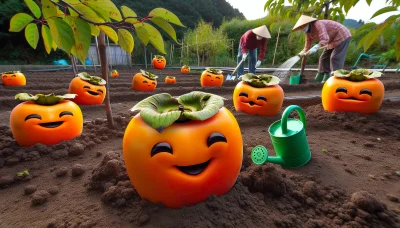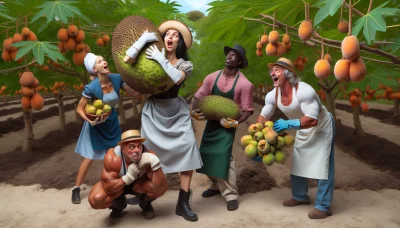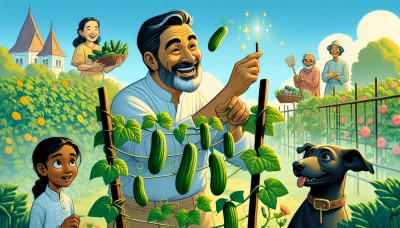Does durian taste good Quiz
Test Your Knowledge
Question of
Does Durian Taste Good?
Durian, often known as the "king of fruits," presents a unique taste profile that divides opinion worldwide. Its potent aroma and rich, custardy texture can be both intriguing and off-putting. Originating from Southeast Asia, durian holds a significant place in gardening and cultivation within the region. Its complex flavors, which can range from sweet and creamy to savory, make it a fascinating subject of culinary exploration. Despite its controversial scent, durian is celebrated for its nutritional benefits and has been an integral part of cultural cuisines and traditions.
Understanding Durian: The King of Fruits
Durian, often referred to as the "King of Fruits," is a distinctive tropical fruit that is highly regarded in many Southeast Asian countries. Its origins can be traced back to the regions of Borneo and Sumatra, and it is now widely cultivated in Thailand, Malaysia, Indonesia, and the Philippines, among others. The fruit is notable for its large size, unique odor, and formidable thorn-covered husk. Durians can weigh up to several kilograms and have a rich custard-like texture with a complex flavor profile that varies greatly among different varieties.
What sets durian apart and earns it the title of "King of Fruits" is not just its physical characteristics but also its nutritional value. It is rich in vitamins, minerals, and dietary fiber, making it a beloved yet controversial fruit. Its polarizing scent, described by some as pleasantly sweet and by others as overwhelmingly pungent, contributes to its unique status. In regions where durian is native, it is more than just a fruit; it is a cultural icon, celebrated in festivals, featured in traditional dishes, and cherished in social gatherings. The durian's standing as the "King of Fruits" underscores its importance in Southeast Asian cuisine and culture, despite the divided opinions on its aroma and taste.
The Polarizing Taste of Durian
Durian, often known as the "king of fruits," elicits a wide spectrum of reactions from those who dare to taste it. For some, durian is a heavenly delicacy, its rich, custardy texture and complex flavor profile unmatched by any other fruit. These enthusiasts often describe the taste as a blend of sweet, almond-like flavors with a creamy consistency that is utterly unique. On the other hand, there are those who find durian repulsive, unable to get past its notorious odor, which has been unfavorably compared to rotten onions, raw sewage, and a plethora of other unpleasant scents. This stark divide in opinion is not solely based on individual taste preferences but is also influenced by factors such as cultural background, exposure, and even genetic differences in smell and taste perception. Consequently, the experience of durian can range from an exquisite pleasure to an unbearable ordeal, making it one of the most polarizing foods in the world.
How to Grow Durian in Your Garden
- Choose the Right Variety: Select a durian variety suitable for your region. Some varieties are more tolerant of different climates and soil conditions.
- Soil Requirements: Durian trees thrive in deep, well-drained, fertile soils. The ideal pH level is between 6 and 7. If your soil is not well-drained, consider planting on a slope or raised beds.
- Climate Conditions: Durian trees require a warm, humid tropical climate. They need temperatures ranging from 24°C to 30°C and high humidity. They are not tolerant of cold temperatures or drought.
- Planting: Plant durian seeds or saplings in a sunny location. Ensure there is ample space as durian trees can grow very large. A spacing of about 25 to 30 feet apart is recommended.
- Watering: Regular watering is crucial, especially in the first year of growth. However, avoid waterlogging as it can harm the tree.
- Fertilization: Feed your durian tree with a balanced fertilizer every 3-4 months. Organic matter like compost can also be beneficial.
- Pest and Disease Control: Monitor for pests such as mites and scale insects. Use organic pesticides if necessary. Keep an eye out for signs of diseases like root rot and treat promptly.
- Pruning: Prune the tree to maintain its shape and remove any dead or diseased branches. This helps in improving air circulation and sunlight exposure to the tree.
- Patience is Key: Remember that durian trees take about 5 to 10 years to bear fruit. Patience and consistent care are essential for a fruitful harvest.
Harvesting and Tasting Your Homegrown Durian
Durians, known for their distinctive smell and unique taste, are a fruit that many grow with anticipation. To determine the right time for harvesting, observe the color and feel of the durian. Ripe durians typically have a slight give when pressed and may emit a stronger aroma. The stem may also begin to crack, indicating readiness. For those trying durian for the first time, approach with an open mind. Start with a small piece to acquaint yourself with its creamy texture and complex flavors. Remember, the experience of tasting durian is subjective and varies widely among individuals.
Durian Varieties and Their Unique Flavors
| Variety | Origin | Taste Profile |
|---|---|---|
| Musang King | Malaysia | Creamy, sweet with a hint of bitterness |
| Monthong | Thailand | Very sweet and buttery, with a custard-like texture |
| D24 Sultan | Malaysia | Bitter-sweet, creamy with a complex flavor |
| Red Prawn | Malaysia | Sweet and creamy with a hint of shrimp |
| Green Skin | Vietnam | Sweet and buttery with a slightly bitter aftertaste |
| Chanee | Thailand | Sweet and creamy with a firm texture |
| Black Thorn | Malaysia | Very sweet, creamy, and sticky with a complex aroma |
Conclusion: Is Durian Worth the Taste?
Durian, often referred to as the "king of fruits," has a reputation that precedes it, marked by a highly divisive taste profile. Its pungent aroma and complex flavor palette can be off-putting to some, while others find it irresistibly delicious. The experience of growing and tasting your own durian can be particularly rewarding, offering a unique sense of achievement and an opportunity to taste the fruit in its freshest, most flavorful state. Despite the mixed opinions, the essence of durian is something that truly needs to be experienced firsthand to be fully understood. We encourage readers to approach durian with an open mind and a spirit of culinary adventure. Who knows? You might just acquire a taste for this controversial but fascinating fruit.












